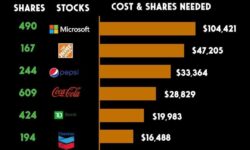Retiring before the age of 40 is every Canadian’s dream, but it’s not always attainable. However, millennials have joined the FIRE movement, which helps them achieve financial freedom at a young age.
What Financial Independence means?
Many people assume that someone who is financially independent (FI) has inherited money, won the lottery, or received some other type of financial windfall. But this isn’t always the case.
In general, financial independence is having enough money to pay your living needs for the rest of your life without working. This FI stage is sometimes disputed. However, there is little doubt that it should be a long-term objective for everyone.
Financial independence, or FI, may happen as early as their late twenties or thirties for some. Others, on the other hand, may never achieve financial independence before reaching retirement age or being compelled to retire for other reasons.
FIRE stands for “Financial Independence Retire Early.” Followers of this movement have only two simple rules – save as much as you can and live a frugal lifestyle. It’s not a get-rich-quick strategy, but they hope to achieve financial freedom quicker and retire early by following these two concepts.
It might be difficult for you to retire immediately, but you can achieve financial independence with smart investing strategies.
Let’s look at a few investment strategies to help you reach financial independence faster while setting yourself up for retirement.
1.Investing in Dividend Stocks
Investing in dividend stocks is growth investing, where you generate tax-efficient dividends paid to you regularly – usually quarterly or annually – and can get reinvested into your portfolio. It’s best to look for a stock that increases its dividends annually. The goal is to build a diversified investment portfolio that generates a tax-efficient income stream with an annual increase.

2. Investing in Index-Based ETFs
Index-based ETFs are exchange-traded funds that try to replicate and track a benchmark index, such as the S&P 500, closely. You can buy an index ETF at any time of the day on major exchanges, and in a single transaction, investors gain exposure to several securities. Index-based ETFs have become popular as investors get low-cost access to diversified strategies.
Make yourself a successful trader or investor by enrolling to trading courses online like Forex trading course, Day trading course and etc. It’s a smart idea to first invest some time and effort in gathering invaluable insight from the best forex trading course available before getting more involved in the market where you can find the best forex mentor for you.

3. Investing in REITs
Real estate investment trusts (REITs) are alternatives to physically owning a property. If you want to invest in property but don’t want to maintain a property, you put your money into the real estate stock market instead. REITs own and operate real estate, allowing people to invest in their properties, and investors get monthly dividend-based income. REITs purchase and manage several real estates, such as retail centers, apartment blocks, etc. REITs will collect rental income and distribute the remaining income to its unitholders after paying their expenses.
You can sell several shares with a REIT, whereas you can’t sell a house in pieces. REITs offer diversification to investors by investing in multiple properties, so it wouldn’t affect your investment when one property suffers financially.
4. Investing Through a Robo-Advisor
Robo-advisors are an innovative way of investing, as they invest your money automatically for you. They are available online only and charge minimal fees. You can set your goals online, and the robo-advisor will give you an investment strategy that aligns with your goals. At any time your life situation changes, you can adjust your goals and how you invest. It’s simple and easy, and available to anyone.
5. Investing in Real Estate
If you’re looking for a safe and risk-free way to increase your net worth, then consider investing in real estate. Real estate investing allows you to diversify your portfolio while investing in properties that multiply in value while growing your income through rental income.
How do you know when you reached financial independence?
Because of its ambiguous definition, the concept of “financial independence” is equally difficult to grasp. When you save nearly 25 times your yearly spending, you are considered financially independent, according to the most frequently accepted definition.
The definition of financial independence will change as the FIRE movement grows. Everyone’s financial situation is different, and I feel that everyone desiring financial independence should have their own definition in order to know when they’ve reached it.
The traditional math behind FIRE has some limitations.
Two rules of thumb are used in the traditional notion of financial independence.
-
The 25 times rule states that if you save 25 times your annual living expenditures, you will be able to retire securely.
-
The 4 percent guideline is then used to calculate how much of your retirement savings you can live on each year.
According to the 25 times rule, if your annual living expenditures are $50,000, you’ll need at least $1,250,000 to retire ($50,000 X 25). You could withdraw a maximum of $50,000 each year ($1,250,000 X 4% ) and pay your living expenses in your first year of retirement if you followed the 4% guideline. Inflation raises the amount you withdraw in later years.
Financial independence looks different for everyone
Money management is referred to as “personal finance” for a reason. The individual conditions of your financial status define what constitutes a good financial decision. Overspending has far more serious repercussions for someone who is heavily in debt than for someone who has $100,000 in the bank.
Our objectives are another distinct issue to consider. If you want to retire in your 40s, you’ll have to make very different financial decisions than someone who wants to retire at 65.When defining what it means to be “financially independent,” it’s important to base your definition on your specific financial condition and objectives.
Conclusion
By investing early, you can achieve financial freedom faster. Spread your investments to diversify your portfolio, look for stocks that pay you dividends, and use online brokers to help you choose your investments based on your goals.
